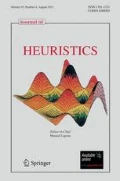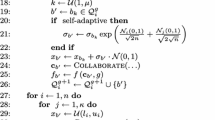Abstract
In a competitive coevolutionary algorithm, the competition strategy, selecting opposing individuals, has a great influence on the performance of the algorithm. Therefore, a good competition strategy is crucial for an effective and efficient competitive coevolutionary algorithm. In this paper, we propose a new competition strategy called tournament competition. We investigate its characteristics and merits when applied to adversarial problems. To verify the performance of the new strategy, we first classify adversarial problems into two types: solution-test problems and game problems. We apply the strategy to both types. A set of experiments compares our strategy to several existing competition strategies and analyzes several aspects such as solution quality, evolution speed, and coevolutionary balance. The experimental results indicate that some of the existing competition strategies give different patterns according to problem types. The results also support that the proposed tournament strategy has the potential for finding good solutions, regardless of problem types.
Similar content being viewed by others
References
Angeline, P.J. and J.B. Pollack. (1993). “Competitive Environments Evolve Better Solutions for Complex Tasks.” In Proceedings of the Fifth International Conference on Genetic Algorithms. San Mateo: Morgan Kaufmann, pp. 264–270.
Freund, Y. and R.E. Schapire. (1996). “Game Theory, on-line Prediction and Boosting.” In Proceedings of the Ninth Annual Conference on Computational Learning Theory. Italy: ACM Press, pp. 325–332.
Goldberg, D.E. (1989). Genetic Algorithms for Search, Optimization, and Machine Learning. Massachusetts: Addison-Wesley.
Hillis, W.D. (1991). “Co-Evolving Parasites Improve Simulated Evolution as an Optimization Procedure.” In Artificial Life II. Massachusetts: Addison-Wesley, pp. 313–324.
Juillé, H. (1995). “Evolution of Non-Deterministic Incremental Algorithms as a New Approach for Search in State Spaces.” In Proceedings of the Sixth International Conference on Genetic Algorithms. Pittsburgh: Morgan Kaufmann, pp. 351–358.
Koza, J.R. (1992). Genetic Programming: On the Programming of Computers by Means of Natural Selection. Massachusetts: The MIT Press, pp. 429–437.
Nolfi, S. and D. Floreano. (1998). “Coevolving Predator and Prey Robots: Do ‘Arms Races’ Arise in Artificial Evolution?” Artificial Life 4, 311–335.
Olsson, B. (1996). “Optimization Using a Host-Parasite Model with Variable-Size Distributed Populations.” In IEEE 3rd International Conference on Evolutionary Computation. Nagoya: IEEE Service Center, pp. 295–299.
Paredis, J. (1995). “Coevolutionary Computation,” Artificial Life 2, 355–375.
Rosin, C.D. and R.K. Belew. (1997). “New Methods for Competitive Coevolution,” Evolutionary Computation 5, 1–29.
Rosin, C.D. (1997). “Coevolutionary Search Among Adversaries.” Ph.D. dissertation. University of California, San Diego.
Sims, K. (1994). “Evolving 3D Morphology and Behavior by Competition.” In Proceedings 4th Artificial Life Conference. Massachusetts: The MIT Press, pp. 28–39.
Author information
Authors and Affiliations
Rights and permissions
About this article
Cite this article
Kim, J.Y., Kim, Y.K. & Kim, Y. Tournament Competition and its Merits for Coevolutionary Algorithms. Journal of Heuristics 9, 249–268 (2003). https://doi.org/10.1023/A:1023769324585
Issue Date:
DOI: https://doi.org/10.1023/A:1023769324585




